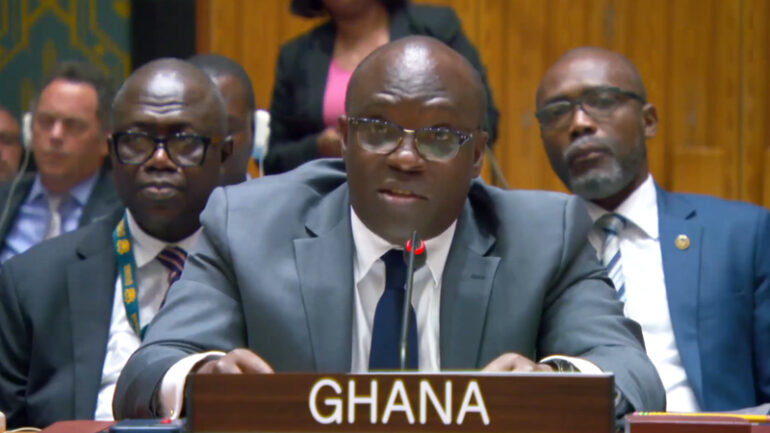UN Security Council Briefing on United Nations Peacekeeping Operations

Ambassador Harold Agyeman
Ghana’s Representative to the United Nations
Security Council Chamber
United Nations, New York
September 07 2023
Mr. President,
Let me begin by thanking USG Jean-Pierre Lacroix for his briefing to the Council, against the backdrop of the Secretary-General’s comprehensive report on United Nations peacekeeping operations.
Even as present-day peacekeeping operations are complicated by dangerous environments and challenging circumstances, Ghana continues to assert the importance of the United Nations role in maintaining international peace and security and the instrumentality of peacekeeping operations in such efforts.
We recognise the significant contributions made by peacekeepers and peacekeeping around the world and pay tribute to all blue helmet personnel who have made the ultimate sacrifice for the cause of peace. At this time, we remember the gallant men and women who have fallen in the line of duty and urge all warring parties to consider their sacrifices and recommit to peace.
Mr. President,
The Secretary-General’s report examines where we are with UN peacekeeping operations, including the parameters used to assess peacekeeping performance, details on the progress in the implementation of the A4P+ priority areas, and recommendations for further improving United Nations peacekeeping to ensure the realization of its full potential.
We welcome the report and associate ourselves with his call for the Security Council and the General Assembly to undertake a comprehensive reflection on the limitations and the future of peacekeeping. Such a reflection is particularly necessary considering the present contexts of conflicts that peacekeeping is called upon to respond.
As signaled in the SG’s report, today’s conflict environments are often marked by geopolitical tensions, proliferation of armed groups, exclusion, inequalities, social and political marginalization, climate insecurity, violent extremism, terrorism and the spread of misinformation and disinformation, as well as food insecurity. These circumstances require us to pivot in some instances, where it is appropriate to do so, from the traditional peacekeeping paradigm.
Mr. President,
For today’s briefing, we would like to highlight three key points.
First, we emphasise the need for primacy of politics in mandates for peacekeeping missions and for this Council itself to work towards streamlining mandates to ensure that they are realistic and set within the known capabilities of what peacekeeping missions can deliver. We must, in this regard, work in a manner that can support peacekeeping missions to harness relevant partnerships to deliver a coherent and unified political strategy for resolving such conflicts, while also closing the gaps between the expectations of local populations and what peacekeeping missions can realistically deliver.
Secondly, we underscore the need to prioritise peacekeeping operations as an integral part of the broader processes for peace and not an activity in isolation. While they may not have a capacity to fully address the underlying causes of a conflict, historical evidence demonstrates that peacekeeping operations can have a transformative impact. Consequently, peacekeeping must be carefully structured and implemented to attain sustainable conflict management outcomes and foster an environment conducive to lasting peace and stability.
Thirdly, we urge a stronger strategic approach to the question of transitions. Peace processes do not end when the last peacekeeper leaves and neither should our commitment. Before, during and after a peacekeeping mission, we must take full advantage of the existing peace toolbox and centralise peacebuilding in breaking the cycles of underdevelopment, inequitable growth, flawed political systems, and the militarization of political systems. Also, the huge gap between the resources we put at the disposal of peacekeeping missions and what we are prepared to give UN Country teams to carryover residual tasks and functions that support peace should be narrowed.
Mr. President,
Ghana remains committed to advancing the effectiveness of peacekeeping and looks forward to hosting a successful Peacekeeping Ministerial Meeting in Accra on 5th and 6th December 2023. We encourage the participation of all delegations and are ready to facilitate their participation.
We are optimistic that, underpinned by the four preparatory meetings, the last of which would be held next month in Kigali, the five themes chosen for the ministerial meeting (namely safety and security of uniformed personnel; strategic communication (including hate speech and mis-and disinformation); mental health of peacekeepers; participation of women in peacekeeping; and the protection of civilians) will engender the necessary pledges to support the implementation of A4P+ initiative.
In concluding, Mr. President, and as highlighted by the Secretary-General in his policy brief on a New Agenda for Peace, this Council, and the wider United Nations, need to embrace African-led Peace Support Operations, funded from UN accessed contributions, if we are to be effective and successful in silencing the guns on the African continent. As a reliable regional partner, the African Union’s resolve to assist this Council maintain continental peace and security, holds the best prospects for preserving the credibility of United Nations peacekeeping and maintaining the peace where limitations in peacekeeping are evident. We therefore look forward to the adoption of a framework resolution on this matter.
I thank you.
